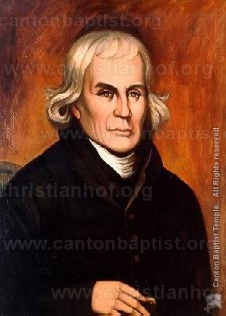Frances Asbury
1745 – 1816
Francis Asbury, the “Father of American Methodism” was born near Birmingham, England. His parents were poor, and Francis was apprenticed to a maker of “buckle chapes” after a short period of schooling. This hard work provided a better foundation than a great education, when one considers the work Francis was to do in America. Francis’ parents were probably converts under the Wesleys, and Francis accepted Christ at thirteen. He soon became active in the ministry and at sixteen became a local preacher.
In 1767 John Wesley recognized his ability and made him an itinerant minister. John Wesley spoke at the annual conference in 1771 and remarked, “Our brethren in America call aloud for help,” and then he inquired (perhaps rhetorically), “Who will go?” Immediately a young man of twenty-six sprang to his feet. The following year, Asbury was appointed by Wesley as “general assistant” in charge of the work in America.
During the Revolutionary War, the Methodists were suspected of Loyalism, principally because they refused to take the prescribed oath; and many of their ministers returned to England. Asbury remained and continued his itinerant preaching. He eventually was driven to exile in Delaware, where he remained quietly, though not idle, for two years.
In 1784 Wesley appointed Asbury and Rev. Thomas Coke as superintendents or “bishops” of the church of the United States. Asbury refused to accept the position until it was ratified by the conference, since Wesley acted before such a conference decision was made. From this conference dates the actual beginning of the “Methodist Episcopal Church of the USA.”
To appreciate Francis Asbury one must examine his tremendous vitality, dedication and executive ability. He preached wherever people congregated: behind the barracks, from a wagon, from a window, upon the banks of a river, in a paper mill, in a tobacco house, and in an orchard. Once at Tarborough he found a fire in the hearth of a small apartment above the courthouse. Supposing it to be for preaching he soon discovered it was for a dance instead. The dancing was soon stopped, and Asbury had a “serious congregation to hear.”
He led in establishing new settlements on the frontier. Annually he rode six thousand miles and preached from three to five hundred sermons. His last entry in his journal reads, “My consolations are great. I live in God from moment to moment.”

